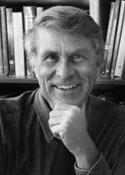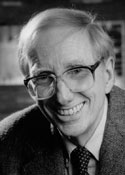Last September, I sat down at UC-Berkeley with the eminent sociologist of religion, Robert Bellah, for a discussion about religious evolution, the ideas of religion and secularism, the rise of extreme positions associated with both of those terms, and the future of universalistic faiths in an emerging global civil society. The following is an excerpt from our discussion, a full transcript of which is available here (PDF).
 MARK JUERGENSMEYER: Today we will be discussing the topic of “Rethinking Secularism in a Global Age.” Bob, the idea is to get around to the contemporary situation, the rise of political Islam, the rise of a new kind of religious politics, the whole issue of what is religious and what is secular in the contemporary world, the rise of global civil society and the role of religion there.
MARK JUERGENSMEYER: Today we will be discussing the topic of “Rethinking Secularism in a Global Age.” Bob, the idea is to get around to the contemporary situation, the rise of political Islam, the rise of a new kind of religious politics, the whole issue of what is religious and what is secular in the contemporary world, the rise of global civil society and the role of religion there.
That’s where the conversation is heading, but I thought we would begin way back in the time that you are currently working in, in ancient history, with the development of religion and religious evolution—the Axial Age, on which you have recently written an essay that is going to be a part of your new book, which I think will be out fairly soon, about the transition from theoria (the word from which we get “theory”) as religious practice and religious insight into, in Plato and the Greek philosophers, a different perception, a different kind of discovery, which was more intellectual than it was spiritual.
Is this about religion? Is this about the emergence of secularism in this particular time? Or do you want to just avoid using those terms altogether?
 ROBERT BELLAH: I certainly think, at this point, both the word “religion” and the word “secularism” are used in such chaotically diverse ways that they are almost useless.
ROBERT BELLAH: I certainly think, at this point, both the word “religion” and the word “secularism” are used in such chaotically diverse ways that they are almost useless.
Nonetheless, I think what you are pointing to is relevant. If you go into the deep evolution of the human species and look for where religion is, you find something that’s quite different from much of what goes on today. Today many people, including the harshest critics of religion, like Dawkins, Hitchens, et cetera, think religion is a theory or a set of theories that are simply wrong: science has disproved those theories; therefore, we don’t need them.
The point of the essay that you are talking about is that theory emerged at a certain moment in human history, and before that, it didn’t exist. We can say it emerged a long time ago, in the middle of the first millennium B.C., about 2,500 years ago. But looking at human evolution, it’s extremely recent; it’s the flick of an eye. Probably between 1 million and 2 million years ago humans communicated entirely with their bodies, what is called mimetic culture. We still do. It is never lost. It’s critical. For religion, it’s absolutely fundamental.
MARK JUERGENSMEYER: But when theoria developed, at least the way you have explained it—the earlier use of the term was related to something we might call religion.
ROBERT BELLAH: Yes, because—again, in this complex use of the word—everything starts with religion. The key to understanding mimetic culture is ritual. I think ritual is the phenomenological basis of all religion. Ritual, of course, is part of our lives. If you live in the university, you are hemmed in by an extremely elaborate set of rituals. We don’t call it that, we don’t remember that, but that’s what it is.
Then, when language emerged around the period—we don’t know for sure—between 50,000 and 120,000 years ago, we get narratives. Narratives add an enormous amount of information to what was communicated through bodily, or mimetic, exchange. Again, we’re still there. Most of our lives are controlled by narratives, not by logical reasoning, not by science. But rational, logical thought emerges at a certain moment, and that is the so-called Axial Age, more or less around 2,500 years ago.
There, too, it comes out of religious experience. The two examples I gave in that little paper are Plato and the Buddha, two of the great rationalists. People who think Buddhism is some kind of crazy mysticism haven’t read very much. The Buddha could give you very definite reasons for everything that he said—he could convince you rationally. He was, of course, coming out of a profound transformative experience that we would call religious.
MARK JUERGENSMEYER: And everything before the Buddha, of course, in the Hindu tradition was ritual, which is about the role of the Brahmins.
ROBERT BELLAH: Well, not everything, because the Upanishads already had the beginnings of something like theoria.
MARK JUERGENSMEYER: Before that, there were the Brahmins and manipulating the gods and the role of—
ROBERT BELLAH: Yes, certainly, before the Upanishads, it’s all ritual. Hinduism is ritual to this day. Of course, all religions are. That’s why refuting religion as if it were a set of theories is not the point, because you are not getting at what religion is all about.
MARK JUERGENSMEYER: But there is ritual without religion. You can say that the way you brush your teeth, the way you comb your hair—
ROBERT BELLAH: Yes.
MARK JUERGENSMEYER: We all live through patterned activity.
ROBERT BELLAH: The way you give a lecture. The academic lecture is one of the most ritualized things in the world, a highly formal ritual.
MARK JUERGENSMEYER: But at what point, then, do you think of ritual in terms of religion? Is it that it is collective or is it the character of a ritual that points to the transcendent? At one point you had a famous quotation about the definition of religion that talked about the transcendent as being an essential character of what we think of as religion.
ROBERT BELLAH: Again, the transcendent—what the hell does that mean?
MARK JUERGENSMEYER: What does it mean? You’re the guy who used it.
ROBERT BELLAH: Yes. I would say this. The religious side of mimetic culture—“ritual culture,” let’s say, which is an easier term than “mimetic”—is that it’s about the most important things. It’s a way of expressing those important things by a group together. But there is a sense in which every form of ritual is quasi-religious. The university is an institution that we believe in. Some of us are ready to lay down our lives for it when it’s under attack. Family ritual is critical—and in danger. The family meal is a central expression of the common life of the family, and it has a religious dimension. The family is an instantiation of a kind of group that, through its deep ties, is tied into and related to some pretty deep meanings. So you are sliding in and out of what is religious and whatever this word “secular” means.
MARK JUERGENSMEYER: Still, despite the fact that you can have sex without marriage, people are getting married.
ROBERT BELLAH: Yes. And now gays want to get married because they want to have that right, too.
MARK JUERGENSMEYER: They want to participate, yes.
ROBERT BELLAH: Yes, they want that as a possible thing to do. In Europe, you have to be married in a secular setting first. Then you can have a church wedding if you want. But in the United States, we think of marriage primarily in a religious context.
MARK JUERGENSMEYER: In the definition of religion that you just used—that is, the kind of patterned activity or thought related to the deepest, most important things in a collective context— marriage, whether you think of it as being religious or not, is religious.
ROBERT BELLAH: It is, yes. I think so. It also, because it’s a powerful force that can compete with other kinds of demands on human beings, can become a negative thing.
MARK JUERGENSMEYER: Right. So now let’s go back to the Greeks. If theoria is now being taken over by the Greek philosophers as a patterned activity regarding thought or ideas, rather than mimetic activity, is this, in a sense, a kind of new religiosity? Classically, we think of the origins of secularism in the Greek philosophers. Yet we had Wilfred Cantwell Smith for a number of years arguing that philosophia—and he went right back to the Greeks, where you do—began essentially as a religious tradition, only not calling it that.
ROBERT BELLAH: It was very convenient for Christians who wanted to adopt a lot of Greek culture to say, “Oh, that’s philosophy, not religion.”
MARK JUERGENSMEYER: Right.
ROBERT BELLAH: But, in fact, of course, it was religious. It always was religious. Pierre Hadot, the great French classicist, speaks of philosophy as a way of life, a total way of life, and certainly always tied into some sense of transcendence. It’s there in Plato centrally, and it’s also there in Aristotle, it’s there in Stoicism. It’s just part of that side of our tradition, and it gets absorbed into Christian theology. Thomas Aquinas, certainly one of the two or three greatest Christian theologians who ever lived, is saturated with Aristotle. So where does philosophy end and religion begin?
MARK JUERGENSMEYER: Right.
ROBERT BELLAH: But theoria, in its pre-philosophic meaning, meant to go and look at a religious spectacle and then come back and tell what you saw. In Plato, it becomes the philosophic quest to actually see the form of the good.
MARK JUERGENSMEYER: Like in the cave.
ROBERT BELLAH: To come out of the cave and see what’s really there, what the truth is, a vision of the truth.
Nonetheless, once you have seen the truth, you look at the normal world in a different way. You see through all of its falsehoods. That gives you the beginning of the chance to use theory in a different way—namely, as a critical form of undercutting accepted beliefs. Certainly, both Plato and Aristotle—Plato was one of the great deconstructionists of all time—he wandered throughout the entire history of Greek culture—Homer, the tragedians, all of Greek poetry—and replaced it with whom? Himself, because he saw the truth and he saw all these people as saying a whole bunch of lies.
That notion of theoria gets into our notion of science. Science takes nothing for granted. It asks questions about everything. There’s nothing that is taboo. We can doubt everything. We can’t doubt everything at once, but at least we can doubt things one at a time. That is a direct inheritance from—the term itself that we use, “scientific theory,” comes from the Greeks.
Download the entire interview here (PDF).











